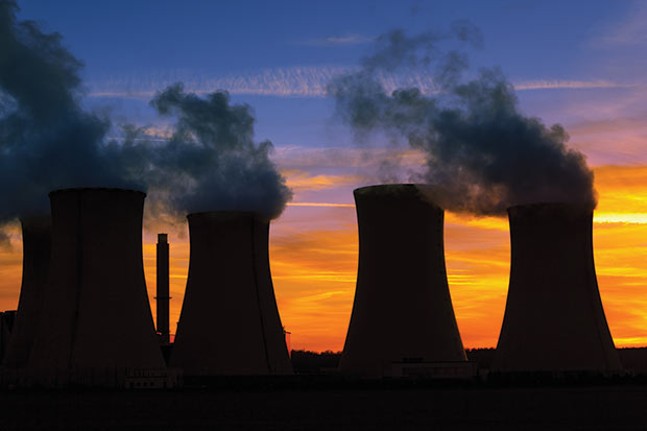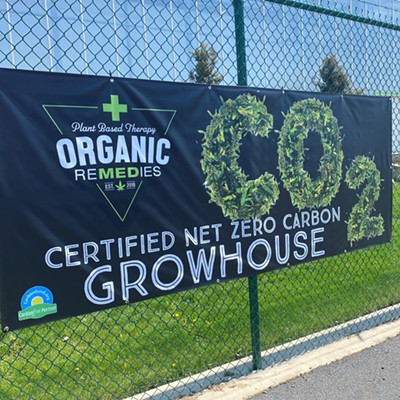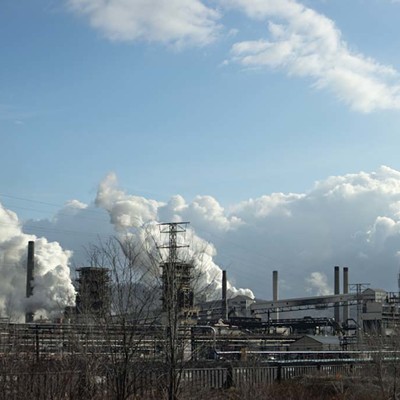One long-running disagreement about the environment isn’t the familiar fight between people who understand that human-caused climate change is real and people who deny it. Rather, it’s between folks who contend that keeping the planet livable requires us to use nuclear energy, and those who say “no way.”
Many pro-nukes types are scientists. In 2015, for instance, a group of 65 biologists wrote an open letter to the Brave New Climate blog, encouraging increased reliance on nuclear energy to protect wildlife and the environment. Nuclear power plants, they note, emit no carbon dioxide or other greenhouse gasses, and take up relatively little space for the power they produce. One biologist told England’s The Independent that a commitment to grow nuclear energy needed to be part of “a full, global-scale assault on fossil fuels.” The Union of Concerned Scientists calls nuclear “an important low-carbon energy source,” albeit one that needs to be made safer.
Opponents of nuclear energy say it’s still too dangerous. They recall the 2011 disaster in Fukushima, Japan, where an earthquake and tsunami led to a meltdown. Spent uranium, critics add, remains lethal for millennia. “Nuclear is no solution to Climate Change,” argues the Sierra Club on its website, “and every dollar spent on nuclear is one less dollar spent on truly safe, affordable and renewable energy sources.”
Still, perhaps paradoxically, the nuclear advocates in this debate are also climate warriors. Most experts agree that to check global warming, we must cut global carbon emissions by 80 percent by 2050. Most green types want to do it by using less energy, and getting what we do need from renewable sources, like sun and wind. But at March 2017’s Pennsylvania Environmental Council conference here called Achieving Deep Carbon Reductions, several speakers argued that decarbonizing the economy that rapidly isn’t possible without nuclear; renewables, they say, can’t be scaled up fast enough. Many speakers advocated preserving generation from existing nuclear plants while exploring the potential for advanced nuclear reactors.
Seems doable. France gets 75 percent of its electricity from nuclear, and countries including Belgium and Sweden get one-third or more. The U.S., historically the world leader in nuclear, gets only about 20 percent, a share unchanged in three decades.
However, while China has begun operating more than 30 new reactors since 2002 (according to the World Nuclear Association), in the past 20 years only one new nuclear plant has opened in the U.S., and prospects for adding to the total of 100 are scant. Cranberry-based Westinghouse went bankrupt last year following construction delays and cost overruns at two nuclear plants it was building down South; one project was abandoned. And if new plants are expensive to build, existing plants are threatened by cheap natural gas, a result of the fracking boom. In Illinois and New York, ratepayers are bailing out aging, money-losing nuclear plants. And this month, federal regulators rejected a Trump administration proposal to subsidize coal and nuclear plants.
Some say hopes for advanced-design plants — which are safer and cheaper to run — are dim, too. “We’re basically dead in the water with respect to advanced nuclear reactors,” says energy expert M. Granger Morgan, a Carnegie Mellon University engineering professor. The federal government no longer adequately funds the research. “The best we’re likely to do is keep existing plants alive,” says Morgan. “We’re not going to be able to add much.”
Maintaining existing plants is important for the climate, says Rob Altenburg, director of environmental group PennFuture’s Energy Center: If those plants were retired, they’d largely be replaced by our present carbon-heavy energy mix of gas and coal. And here’s an irony: The best way to help nuclear compete with gas might be to institute a federal carbon tax — also a favorite environmentalist proposal for boosting renewable energy. But with climate-deniers dominating Congress and the White House, a carbon tax seems unlikely just now.
Can we fight climate change without scaling up nuclear power? Looks like we’re going to find out.


















